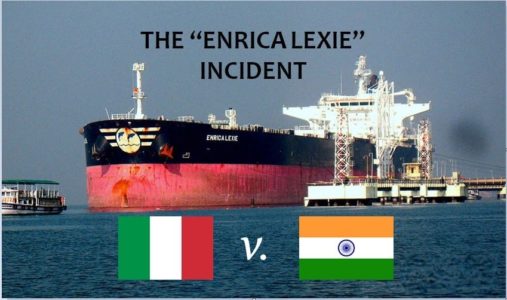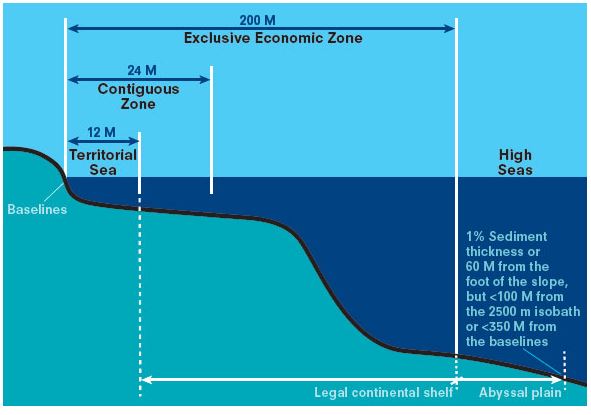Italian Marines Case and UNCLOS

From Current Affairs Notes for UPSC » Editorials & In-depths » This topic
IAS EXPRESS Vs UPSC Prelims 2024: 85+ questions reflected
In early July 2020, An extract of the final award of the ad-hoc tribunal constituted to settle disputes related to the United Nations Convention for the Law of the Sea (UNCLOS) regarding Italian marines Case between India and Italy was published by the Permanent Court of Arbitration (PCA). It has ordered to cease all criminal proceedings against the two Italian Soldiers in Indian courtrooms by rejecting India’s contention that the soldiers, who were accused of killing Indian fishermen, could be trialled in Indian courts. Following the order, Centre has made a plea in Supreme Court seeking the closure of cases against the Italian soldiers. But the Supreme Court has refused to pass any such order without hearing victims’ kin and getting them paid the compensation. In this context, let’s make a detailed examination of the UNCLOS maritime zones and controversial Italian Marines Case.
What are the UNCLOS maritime zones?
- UNCLOS is also known as the Law of the Sea Convention or the Law of the Sea Treaty that defines the rights and responsibilities of nations towards the use of the world’s oceans.
- The third session of the United Nations Conference on the Law of the Sea (UNCLOS III) which was held between 1973 to 1982 led to the formation of the current convention named UNCLOS, which divides marine areas into five main zones namely
- Internal Waters
- Territorial Sea
- Contiguous Zone
- Exclusive Economic Zone (EEZ)
- The High Seas
- The baseline is the low-water line along the coast as officially recognized by the coastal state.
- Internal waters are waters on the landward side of the baseline from which the breadth of the territorial sea is measured. Each coastal state has full sovereignty over its internal waters as like its land territory. There is no right of innocent passage through internal waters.
- The territorial sea extends seaward up to 12 nautical miles (nm) from its baselines. The coastal states have sovereignty and jurisdiction over the territorial sea. But the coastal states’ rights are limited by the innocent passage through the territorial sea.
- The contiguous zone extends seaward up to 24 nm from its baselines. The coastal state has the right to both prevent and punish infringement of fiscal, immigration, sanitary, and customs laws within its territory and territorial sea.
- Each coastal State may claim an EEZ beyond and adjacent to its territorial sea that extends seaward up to 200 nm from its baselines. Unlike the territorial sea and the contiguous zone, the EEZ only allows for the resource rights such as Sovereign rights to explore, exploit, conserve and manage natural resources, whether living or nonliving, of the seabed and subsoil etc.
- The ocean surface and the water column beyond the EEZ are referred to as the high seas. States can conduct activities in these areas as long as they are for peaceful purposes, such as transit, marine science, and undersea exploration.
What is Italian Marines Case?
- In 2012, Two Italian marines posted on oil tanker Enrica Lexie had opened fire on an Indian fishing boat was within the country’s Contiguous Zone, killing two crew members apparently mistaking them for pirates near the Kerala coast.
- Following the incident, the Indian police had arrested and detained two Italian marines involved in the crime scene.
- Italy challenged the arrest of marines before the Kerala High Court stating that India has no jurisdiction to try Italian naval marines. Italy provoked Article 97 of the United Nations Convention on the Law of the Sea (UNCLOS).
- The case had become a major bone of contention between the two countries with India insisting that it could try them as the incident occurred in its territorial waters. Italy contested this on the ground that the ship flew an Italian flag and hence the crew would be tried under the Italian law.
- The matter was taken up by the Supreme Court and the apex court ruled that as per the Indian government notification issued in pursuance of the Convention on the Law of the Sea, India has jurisdiction over the entire 200-mile Exclusive Economic Zone, and thus the case can be trialled in India. It stated that only the Indian Government can exercise jurisdiction, not the state government.
- As ordered by the Indian Supreme Court, to determine the applicability of jurisdiction, India had set up a specially designated court at that time.
- The two Italians were already being charged by NIA under sections of the Indian Penal Code, related to murder, attempt to murder, mischief and common intent and also invoked the Suppression of Unlawful Acts against the Safety of Maritime Navigation and Fixed Platforms on Continental Shelf Act, 2002.
- In 2015, Italy moved the International Tribunal for Law of the Sea (ITLOS), an arbitral tribunal under the International Court of Justice and filed an arbitration case under Annex VII of UNCLOS, seeking for two Italian marines to stay in their own country during the trial process and also to stop India from going ahead with its criminal prosecution.
- The ITLOS judgement of 2015 called on Italy and India to suspend all domestic prosecutions arising from the Italian Marines case. It had also ordered not to initiate any steps that might jeopardize or prejudice the carrying out of any decision which the arbitral tribunal may provide.
- Italian marines Massimiliano Latorre and Salvatore Girone returned from India to Italy in 2014 and 2016 respectively on health grounds.
- Until the reset in 2016, This issue has led to a long freeze in diplomatic relations between India and Italy.
- Italy later took the issue to an international tribunal constituted under the UN Convention on the Law of the Seas in Hague, Netherlands.
- The Permanent Court of Arbitration heard the case in July 2019.
- The final ruling in the Italian Marines Case by the Permanent Court of Arbitration came on 31 May 2020
What are the key points that can be inferred from the recent judgement?
Judgements in Favor of India:
- According to the tribunal, the actions of the Italian military officers breached India’s freedom of navigation under UNCLOS Article 87(1)(a) and 90 and India is entitled for payment of compensation in connection with loss of life, physical harm, material damage to property and moral harm suffered by captain and crew of ‘St Antony’, the Indian vessel.
- It mentioned that India was entitled to compensation and asked India and Italy to consult on the amount of compensation due.
- It struck down Italy’s claim for compensation for the marines for the duration of their stay at the Italian Embassy.
Judgements against the interests of India:
- India had called on the Hamburg based ITLOS to adjudge and declare that PCA has no jurisdiction concerning the case submitted to it by Italy. However, a majority of the court’s five-member bench ruled 4-1 that it had jurisdiction in the matter.
- According to the verdict (3:2 verdict), Both India and Italy had concurrent jurisdiction over the incident and a valid, legal basis to institute criminal proceedings against the marines. However, Italy would have jurisdiction to decide on the question of immunity for the marines and the marines were entitled to immunity as they were acting on behalf of a state. Thus, India is precluded from exercising its jurisdiction.
What can be the way forward?
- As a good international citizen, India has accepted the tribunal’s award and therefore it is the duty of India to ensure that Italy fully honours it and should also to monitor the case proceedings in the Italian court against two Italian soldiers by instructing the Indian Embassy in Italy that a diplomat should always be present during court proceedings.
- The tribunal’s decision on the marines’ immunity sets a dangerous precedent as countries may now be tempted to enact specific laws to give immunity to its defence personnel and state official.
- Learning a lesson from this, India shall enact a clear set of rules around issues of immunity as well as jurisdiction.
Conclusion
- Though the recent PCA verdict on the Italian Marines case can be seen as a huge setback for the expectation of India that the two marines would face a criminal trial in India, Drawing lessons from this experience, India should adopt necessary changes in the legal and diplomatic domains as soon as possible.
Practice Question for Mains
- Considering the recent setback India faced in the Italian Marines Case, It is high time for India to revisit its legal and diplomatic relations with other countries. Comment (200 Words)
If you like this post, please share your feedback in the comments section below so that we will upload more posts like this.



